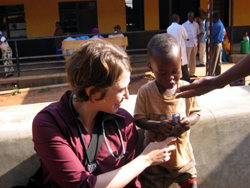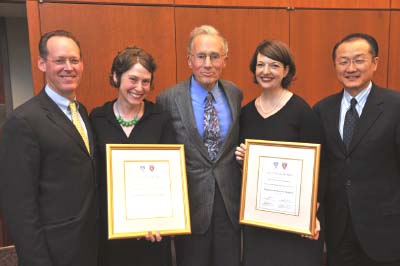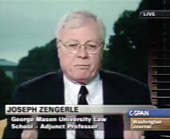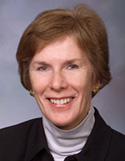When I received this
e-mail, considering that so much had happened
with the Heimlich story since his half-hour
interview with me and Karen two years earlier, I
offered to provide Zengerle with fresh quotes.
His reply? No, that wouldn't be necessary. Then
he goes to print and portrays me as if I'm
hiding in the shadows.
Like any writer,
Zengerle is entitled to disagree with me and to
characterize me as he chooses. But writing a
critical article about someone while denying
them the opportunity to speak or defend
themselves is fundamentally dirty journalism.
What reputable newsmagazine would accomodate
that?
When these and other
concerns were brought to Foer, here's how he
responded in an October 2, 2007
e-mail:
The article was
factchecked by a member of our editorial
staff (writers are not permitted to
factcheck their own work)...I was also aware
that Jason's article had been rejected by
several other publications--and was in fact
grateful that it had been since I was
excited for TNR to run it. It is a masterful
piece of writing and reporting.
But I was a centerpiece of the article
and Zengerle's April 4, 2007 e-mail was the
only fact-checking communication I ever
received. Others mentioned in the article have
told me they were never contacted for
fact-checking, so Foer was either lying,
incompetent, or both. In any event, the
situation raises at least two questions:
1) According to Foer,
Zengerle violated TNR policy by fact-checking
his own article - "writers are not permitted to factcheck
their own work" - so shouldn't Zengerle
be disciplined?
2) If I had been
contacted for a legitimate fact-check, I could
have fixed the numerous factual errors in the
article. Better yet, I could have alerted the
magazine that Zengerle was intentionally duping
its readers. Here's one indisputable example:
(Dr.)
Heimlich
started off, in the mid-'50s, by introducing
a surgery that made it possible for people
with severe esophageal damage to swallow
food. He called it the "Heimlich operation."
Zengerle was aware of
this
2003
Cincinnati
Enquirer
front page article that exposed my
father's false claims about the esophosgus
operation, but ignored it. Why
would he give undeserved credit to my father and
mislead TNR readers about this straightfoward
fact?
And why, after expressing such
antipathy to my father, did Zengerle portray him
in such an uncritical (and false) light,
meanwhile going to great lengths to set up and
then sucker-punch me? If he wanted to write a
story that was critical of me and my response to
my father's work, why not just write it? Why all
the deception?
3)
"None of my business" - Zengerle's AIDS
researcher wife
After
the TNR article appeared in April 2007, we
realized that Zengerle had punk'd us, but we
didn't know why. So I started digging. I started
with old e-mails and immediately realized
Zengerle had lied to us from day one in order to
gain access to us and to our files. When he
first contacted me, I asked how he got
interested in writing a story about my father.
Here's his answer from a
March 3, 2005 e-mail (my
underlining):
As for how the story of your
father came to my attention, a friend of mine
doing HIV research in Africa told me about his
malariotherapy ideas several years ago and
since then I've been following his story and
waiting for the right moment to write about
it.
But
two years later, in the first few minutes of this April
27, 2007 in-house audio interview
he gave to New Republic managing editor
Katherine Marsh, Zengerle told the same story,
but with a significant change:
Marsh: We're talking about Jason
Zengerle's fantastic story called "The Choke
Artist" about Henry Heimlich. Jason, one of the
things I'm sort of interested in finding out is
what attracted you to Heimlich's story and how
you became interested in it in the first place?
Zengerle: Well, a few years ago
my wife who at the time was in med school was
doing some HIV work in Africa and she heard
from some colleagues over there about Henry
Heimlich and how he had this idea about
malariotherapy which was treating HIV by
intentionally infecting people with malaria
and she came back to the states and told me
about that and I just thought, first of all, I
didn't even realize that there was such a
person as Henry Heimlich.
So the "friend" was,
in fact, Zengerle's wife? Why did he lie to us
about that? I smelled a rat, so I wrote a polite
note to Zengerle and asked for more information.
Here's the Q&A:
PH: What's your
wife's name? What she was doing in Africa,
where was she working, when was she there,
and who was her employer? Who were the
"colleagues" who told her about the Heimlich
Institute's African experiments?
JZ:
None
of your business.
I disagreed, so I
started poking around. Zengerle lives in Jamaica
Plain, near Boston, so I checked Suffolk
County, Massachusetts property records. It
turns out that he co-owns a condo with
his wife. Her name is Claire Farel.
I then Googled her
name and what do you know? Dr.
Farel
is
an
AIDS and malaria immunology researcher,
affiliated with Harvard and the National
Institutes of Health, who has authored articles
in prominent medical journals.
photo
source

Claire Farel MD
To my inexpert eye,
Dr. Farel's expertise appeared to be related to
aspects of my father's "malariotherapy" claims.
For example, she was lead author on an AIDS
research study in which three of her co-authors
had written an earlier NIH AIDS research study,
a study my father has repeatedly cited as key
evidence to support his "malariotherapy"
theories.
Dr. Farel is also a
colleague of two of the most prominent critics
of my father's AIDS experiments, Drs. Anthony
Fauci and Paul Farmer. Dr. Fauci was interviewed
by Brian Ross in the
ABC 20/20 report about my father.
Strong critical quotes from Dr. Farmer were
included in this
2003 Lancet article about
the China experiments.
From Infection
Induction
and
Maintenance
Therapy with Intermittent Interleukin-2 in
HIV-1 by Claire E. Farel et
al:
Acknowledgment:
The participation of the patient volunteers,
the numerous contributions of the Clinic 8
nursing staff, and the ongoing scientific
guidance of Dr. Anthony S. Fauci, Director
NIAID, throughout the performance of these
trials are acknowledged with gratitude.
Here's Dr. Farmer
participating in Dr. Farel's graduation
from
a
special
medical residency program in Global Health at
Boston's Brigham and Women's Hospital. From what
I gather, she has a special interest in
providing with quality health care to patients
in underdeveloped countries.

From left, Paul
Farmer, Claire Farel, Howard Hiatt,
Amy Sievers and Jim Yong Kim at the second
graduation ceremony for the Global Health
Equity Residency.
Before then, from 1995-99
she worked as a research assistant to
leading
AIDS
expert Charles van der Horst MD:
My point? Ten years before her
husband published his TNR article,
Zengerle's wife worked with one of the world's
leading AIDS researchers and dealing with
sophisticated medical and bioethics issues.
You might think that
given such ready access via his wife to such
top-flight experts, Zengerle would have
interviewed them for his Heimlich article. If he
did, there's no sign of it in his article.
Zengerle's story does include a quote from Dr.
Fauci, however he lifted it without attribution
from Pamela Warrick's landmark 1994 Los Angles
Times front-pager, "Heimlich's
Audacious
Maneuver."
On the other hand, I'm
aware that Zengerle did interview at
length a string of prominent medical experts who
have been vocal public critics of my father, but
left them out of his article. Why?
In 2003, after I
helped expose the Heimlich experiments in China,
the result was a media firestorm with separate
bylined reports in the NY Times, the LA Times,
CNN/Reuters, the Cincinnati Enquirer, and
elsewhere. Therefore Zengerle knew that exposing
the Heimlich "malariotherapy" experiments in
Africa would have made international headlines,
perhaps an even bigger explosion. Instead he
buried the information in his TNR article:
"Now I will
tell you about the malariatherapy, or
immunotherapy as we now call it, in Africa."
He began to read from one of the sheets.
"The Heimlich Institute has been collecting
CD4 and viral load data on patients who are
HIV-positive and have become infected with
malaria. This data will provide support for
the concept of using malariatherapy for
treating HIV infection." The study involved
the questionable practice of initially
withholding treatment for malaria, so
Heimlich would not tell me where in Africa
this new malariatherapy trial was being
done. "You never know how the politicians
will react in these countries," he
explained. But, according to a public health
physician who has worked on AIDS in East
Africa and has knowledge of Heimlich's
latest project, the study site is in
Ethiopia. An official with the Ethiopian
Ministry of Health told me that the ministry
is unaware of any malariatherapy work being
conducted in the country and that, if it is,
it is being done without proper notification
and permission.
Still reading
from the papers, Heimlich boasted about the
study's early results. Six of the first
seven HIV patients treated with
malariatherapy, he claimed, had experienced
decreases in their viral loads. Now he was
eagerly anticipating results from the 42
other patients in the study...
Zengerle was granted
unprecedented access to my father and to the
medical records from the clandestine Africa
experiments. Zengerle knew the data in those
records was obtained in violation of
international laws that protect human research
subjects. Any expert, including his wife, could
have told him that.
Publishing the details
- the names of participating medical
professionals, the medical facilities that were
involved, the funders - would have been a major
media coup for Zengerle and The New Republic.
Instead his article failed to include any
identifying details, such as the "public
health physician who has worked on AIDS in
East Africa and has knowledge of Heimlich's
latest project...in Ethiopia" from the
above paragraph.
To my knowledge,
Zengerle is the only reporter who has ever had
access to the who/what/where/when details of the
Africa experiments, yet none of those details
are in his article. Why not?
4) "Conjecture,
leaps
of
logic,
and assumptions of almost epic bad faith"
What if anything did Dr. Farel know
about the Heimlich experiments? Rather than jump
to conclusions, I took to heart Zengerle's
assessment of my work from his
TNR article:
(Some) of the
most damning accusations Peter has
leveled...appear to be based on a
combination of conjecture, leaps of logic,
and assumptions of almost epic bad faith.
So first I wrote Zengerle, but he
didn't answer, so I decided to try and get
answers from the horse's mouth:
Date: Sat, 20
Dec 2008 12:12:04 -0500
From: "Peter M. Heimlich" <pmh@medfraud.info>
To: Claire Farel MD
Subject: research inquiry
Dear Dr. Farel,
I'm trying to
get in touch with you regarding the Heimlich
Institute's "malariotherapy" experiments.
Please confirm receipt and I'll follow-up
with my inquiry.
Thanks and
looking forward to hearing from you.
Sincerely,
Peter M.
Heimlich
(Address
redacted)
vm/FAX: (208)474-7283
e-mail: pmh@medfraud.info
http://medfraud.info
I didn't receive a reply to the above
e-mail or to a January 2, 2009 follow-up. Six
months later I sent this to her and copied her
husband:
Date: Wed, 01
Jul 2009 08:01:55 -0400
From: "Peter M. Heimlich" <pmh@medfraud.info>
To: Claire Farel MD
CC: Jason Zengerle <jzengerle@tnr.com>
Dear Dr. Farel:
I attempted to
contact you via a December 15, 2008 e-mail
to your husband. I didn't receive a reply,
so I sent you an e-mail & fax on
December 20, 2008. I didn't receive a reply
so I made a second attempt on January 2,
2009. I didn't receive a reply to that
either.
I'm attempting
to learn more about your knowledge of the
Heimlich "malariotherapy" experiments in
Africa, which your husband says you learned
about from colleagues when you were doing
HIV work in Africa. For publication, I'd
appreciate your answers to the following
questions.
1)
Approximately when did your colleagues tell
you about the experiments? Who were the
colleagues and what did they tell you?
2) At the time,
who was your employer and what sort of HIV
work were you doing? Was your work
publicly-funded?
3) Did you or
anyone else you know report the Heimlich
experiments to any oversight organization?
4) Have you
ever communicated with any employees or
representatives of the Heimlich Institute?
Thank you for
your consideration and I look forward to
receiving your answers. I may have
follow-ups.
Sincerely,
Peter Heimlich
(Address
redacted)
ph/FAX: (208)474-7283
cc: Jason
Zengerle
Again, no reply. Here's my fourth and
final e-mail:
Date: Wed, 22
Jul 2009 10:10:55 -0400
From: "Peter M. Heimlich" <pmh@medfraud.info>
To: Claire Farel MD
CC: Jason Zengerle <jzengerle@tnr.com>
Dear Dr. Farel:
I have not
received a reply to my July 1, 2009 e-mail
to you that was courtesy-copied to your
husband, Jason Zengerle. For publication, I
would appreciate your answers to the
following questions.
1) Have you
ever had a financial relationship with any
employees or representatives of the Heimlich
Institute?
2) Were you in
any way involved with the Heimlich
Institute's "malariotherapy" research in
Africa or elsewhere?
Thank you for
your consideration and I look forward to
receiving your answers. I may have
follow-ups.
Sincerely,
Peter Heimlich
(Address
redacted)
ph/FAX: (208)474-7283
cc: Jason
Zengerle
I've never received any communications
from Dr. Farel, but ten months after my last
attempt, I received an unsolicited May 5, 2010
e-mail from Zengerle that included:
A little while
ago, a reporter emailed Claire some
malariotherapy/Heimlich questions. Since the
reporter wasn't you - or one of your obvious
cat's paws - she sent him a response. I
thought I'd pass it along to you. She wrote:
"I heard about
Henry Heimlich's . malariotherapy. work in
the summer of 2000, when I was in between my
first and second years of medical school. I
spent that summer in Malawi, where I worked
on predictors of outcomes in children with
cerebral malaria. Since I was already in
Malawi that summer, I was able to attend the
International AIDS Conference in Durban,
South Africa. It was during that conference,
in casual conversation with some of the
other attendees, that I heard one of them
mention Heimlich's malariotherapy. work in
the context of how crazy it was. (I. m
sorry, but I can. t recall who mentioned it;
there were thousands of people at this
conference.) Heimlich and his malariotherapy
ideas were fairly old news among HIV docs,
although they remained a source of morbid
fascination, but I'd never heard about them
before. In fact, I didn. t even realize that
the Dr. Heimlich who. d invented the famous
maneuver was still alive - much less engaged
in something as dubious as malariotherapy
for HIV. When I got back from Africa, I
mentioned to Jason these two strange facts,
and that was how he got interested in the
subject of Heimlich and malariotherapy."
Zengerle's e-mail didn't mention if
the reporter had submitted to Dr. Farel any of
the questions I sent her - about whether she had
any connection to the Heimlich Institute or to
the "malariotherapy" experiments - or whether
she provided the reporter with any related
response.
5)
Zengerle's threat to violate reporter/source
confidentiality
The next day, Zengerle
sent me a follow-up e-mail in which he claimed
he was no longer bound by the reporter/source
confidentiality agreement he made with me when
he was employed by the New Yorker. He
also threatened to publish information I
provided to him based on that agreement.
Here's what I wrote
back:
6)
Conclusions
As a whistleblower who
uncovered a complicated 50-year history of fraud
- centering around my famous father no less - I
owe lifelong gratitude to the many journalists
who helped bring out the truth, from the
alt-newsweekly reporters who did much of the
heavy lifting up to Brian Ross's ABC 20/20 news
team. The experience taught me deep and abiding
respect for the importance of a free press and
the power of the news media.
Unfortunately, along
the way I also had experiences with a few bad
apples who misused that power. Zengerle was
by far the rottenest. His threat to violate
reporter/source confidentiality is only the most
recent example.
Was Jason
Zengerle's AIDS researcher wife involved with
the Heimlich Institute's "malariotherapy"
medical atrocity experiments in Africa? Was
his Heimlich article a clumsy attempt
to derail me from eventually getting
to that information? All I know
is that when I sent courteous,
reasonable questions to Dr. Farel, she
wouldn't answer.
As
for Zengerle
- who writes almost exclusively about
politics - he claims he decided to write
about this obscure medical
subject precisely when I was
making headway exposing the Heimlich
atrocity experiments. He lied to my
wife and me to gain access to our
files, copied a thousand pages of our work,
lied to us repeatedly over the next few
years after the New Yorker spiked his article,
then managed to get the New
Republic to publish what turned out to
be a hit piece about me, filled
with information he knew to be
false, and which - contrary to a lie told
by his editor Franklin Foer - was not
independently fact-checked.
In
days
to come, I expect to learn more. In
the meantime, here's my advice: if you're an
editor, fact-check every sentence Jason Zengerle
submits. If you're a source, don't trust the
bastard.
Addendum A: more Zengerle family values


Joseph
Zengerle,
Esq.
Lynda Zengerle, Esq.
Jason Zengerle is not without his
supporters. Here's a
letter from his parents, both big shot
lawyers in Washington DC (click their names for
identification):
We just saw the
20/20 segment tonight on Dr. Heimlich, which
tracks almost exactly the long piece called
"The Choke Artist" in the April 23, 2007
issue of The New Republic by our son, Jason
Zengerle. That story represents an
extraordinary research and writing effort on
his part, not to mention his original
thinking in conceiving the story, and it
looks like you cribbed it without so much as
an attribution. Shame on 20/20 and ABC for
not having more integrity about where you
get your ideas, indeed the structure of the
entire script.
Joseph
and
Lynda
Zengerle, June 2007
Presumably Ma & Pa Zengerle didn't
know that their son cribbed the theme of his
article, a theme he knew to be false, from
the Cincinnati Business Courier,
published two years prior. So much for original
thinking, attribution, and integrity. As for
their son's "extraordinary research and
writing," The New Yorker and the string
of other publications that rejected his article
weren't impressed.
Nevertheless, such parental concern is
touching. After all, how often do the parents of
a national newsmagazine journalist publicly
speak up to defend their child?
Addendum
B:
Questions
- Should Zengerle have disclosed to TNR
readers that his wife was an AIDS immunology
researcher who provided him with the information
that led him to report about the Heimlich AIDS
experiments? Wouldn't that have added some color
to his article? Why did Zengerle lie to Karen
and me, transforming his wife into his "friend"
in order to gain access to my home and to my
work?
- Why did Zengerle copy 1000+ pages of
my research, then knowingly use fabricated
information in an apparent attempt to undermine
my credibility? Why did he lead us to believe I
would be mentioned only in passing in his
article, then make me a focus? Putting aside
that deception, if he wanted me to be the focus,
why would he only rely on a half-hour in the
record interview he did with me over two years
before his article was published? Why did he
refuse my 11th hour offer to provide him with
fresh quotes?
- Why did Franklin Foer falsely claim
Zengerle's article had been independently
fact-checked? Why did Foer claim that TNR
writers were not allowed to fact check their own
work, yet the only fact check contact I had was
with Zengerle? Along with all the other problems
with Zengerle's article that had been rejected
by the New Yorker and a string of
publications, why would TNR want to publish
stale two-year-old information as if it were
fresh?
- Since 2003, dozens of reporters have
written serious, critical articles about my
father. For years, he refused to speak to all
but one: Jason Zengerle, who was granted full
access and interviewed my father for hours
during repeated trips to Cincinnati, presumably
on his New Yorker expense account. Why
did Zengerle get carte blanche while all other
reporters were handled by Bob Kraft my father's
former press agent and Zengerle's
Facebook friend?
- How is it that Zengerle, who writes
almost exclusively about politics, happened to
choose to write an article about an obscure
medical topic exactly when Karen and I were
starting to make headway in the press to expose
the Africa "malariotherapy" experiments which -
if the details and participants were tagged -
might result in a media blow-up similar to what
happened in 2003 when UCLA
researchers got nailed for participating
in the Heimlich "malariotherapy" experiments in
China? Zengerle conducted hours of interviews
with my father, but didn't get around to asking
him for the names of the doctors who ran the
Africa experiments, which could have resulted in
a similar monster story for him in The New
Yorker? After reading Thomas
Francis's hard-hitting, fact-laden Radar
expose, did New Yorker editor Amy
Davidson realize that Zengerle had punk'd her,
too?
- How was it that Zengerle's
2007 TNR article failed to mention US
congressional candidate Dr.
Victoria Wells Wulsin, who worked on the
Heimlich Africa project and was a key focus of Thomas
Francis's 2005 Radar expose? Zengerle
wrote me this June 7, 2005 e-mail saying he had
left a message for her, but then he left her out
of his article. Why would Zengerle - a political
writer - avoid such a newsworthy hook? (Since
then, Dr. Wulsin has been dogged by her
affiliation with the experiments, which became a
central issue in the 2008 Ohio 2nd congressional
race, probably the first time abusive human
subjects research was used in a political
campaign. Click
here for more information, including video
ads produced by her political opponents
regarding Dr. Wulsin's involvement with the
Heimlich Institute.)